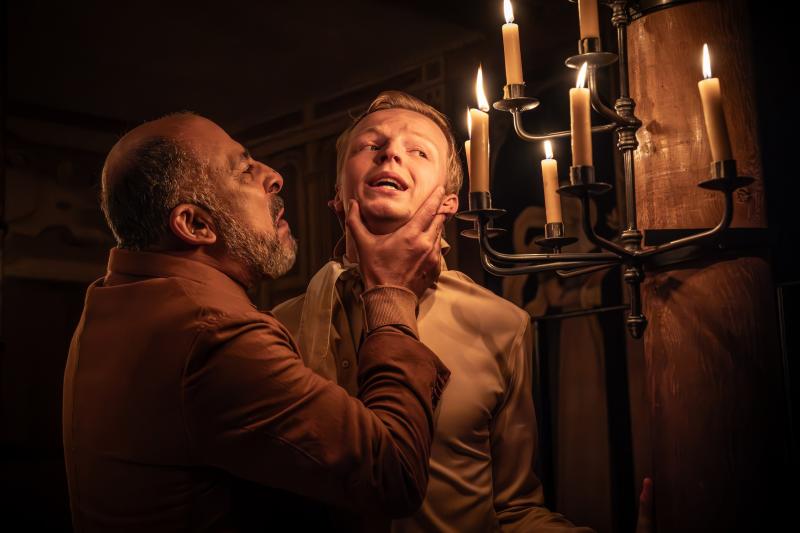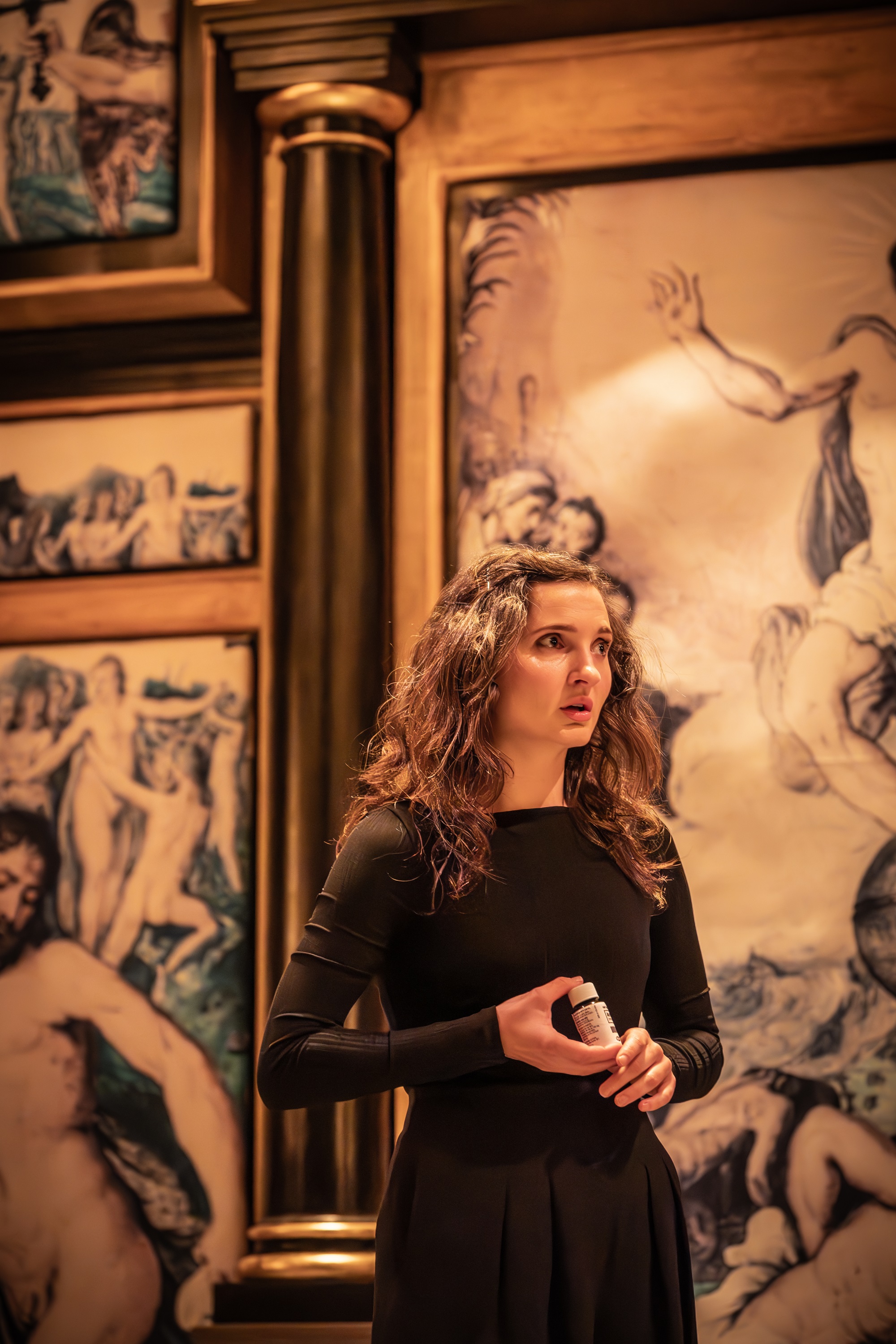All's Well That Ends Well, Sam Wanamaker Playhouse review - Shakespeare at his least likeable | reviews, news & interviews
All's Well That Ends Well, Sam Wanamaker Playhouse review - Shakespeare at his least likeable
All's Well That Ends Well, Sam Wanamaker Playhouse review - Shakespeare at his least likeable
New production lands on shaky ground in 2024

"All’s well that ends well". Sounds like the kind of phrase a guilty parent says to a disappointed child after they’ve been caught in a white lie and bought them a bag of sweets to smooth things over. It’s a saying that betokens bad behaviour, a need to sweep things under the carpet, portending a fresh start. There’s an edge of power in it too, implying that the speaker can now define their interlocutor’s feelings. In short, it’s ugly.
So too is the play of the same name, a soi disant "problem play", Shakespeare at his more mean-spirited, sometimes giving the impression of indulging in a bit of score-settling. It’s less performed than even slaughter-fests like Macbeth as a result. The key question for a punter is whether it’s worth swallowing all that bile for the intrigue of its ethical questions, its subversive gender and class relations and its cruel humour.
 We open on the Sam Wanamaker Playhouse’s beautiful, even Christmassy, candles and its harsh, pew-like seats - it’s not the last contradiction of the evening. Helen (Ruby Bentall, pictured right), a maid as well as a maiden, is glaring at Bertram (Kit Young), the posh-boy son of a countess, who looks on her, and later speaks to her, with barely concealed contempt. Soon she’s in (crocodile) tears, always with one eye on currying sympathy from his mother (Siobhan Redmond, displaying the only decency we’ll see all night), before swigging the dregs of the cognac and revealing herself a resourceful woman indeed, blessed with plenty of the cojones the men are lacking.
We open on the Sam Wanamaker Playhouse’s beautiful, even Christmassy, candles and its harsh, pew-like seats - it’s not the last contradiction of the evening. Helen (Ruby Bentall, pictured right), a maid as well as a maiden, is glaring at Bertram (Kit Young), the posh-boy son of a countess, who looks on her, and later speaks to her, with barely concealed contempt. Soon she’s in (crocodile) tears, always with one eye on currying sympathy from his mother (Siobhan Redmond, displaying the only decency we’ll see all night), before swigging the dregs of the cognac and revealing herself a resourceful woman indeed, blessed with plenty of the cojones the men are lacking.
Gambling, literally, her life, she uses her late father’s apothecary’s potions to cure the King, then exercises her reward in naming her husband (that’s you-know-who), but, horrified at a match with a low-born woman, Bertram’s for war in Italy, the marriage left unconsummated. But she’s for chasing him, in disguise of course, with the aim of getting pregnant with his child, acquiring his ring and, in consequence, sealing the deal.
Young’s line readings are as good as I’ve heard this year, bringing out the blank verse alongside Bertram’s disdain for those socially beneath his station and for women in general. He’s an attractive person – he has to be in order to be the object of Helen’s desire, for she is no fool – but there’s an immature laddishness with a side-order of narcissism that makes him if not quite repellent, then certainly a bit of a wrong-un. Wealth and entitlement has a habit of doing that to young men – and they don’t all grow out of it.
In Chelsea Walker’s new production, there’s something else too. There’s an undertow of sexual desire that pulls his friend, the hapless soldier Parolles (William Robinson), to his commanding officer, that is, at least partially, returned by Bertram. If we hadn’t guessed already, it hints at another reason for his rejection of his marital obligations. Having the two men kiss on stage does thumb the nose at 400 years of gay suppression in staging Shakespeare, but it also lands like listening to someone explain their joke – as ever, exposition best left undone.
Bentall catches something of Helen’s ambiguity – she’s not just a golddigger, she really is besotted as only teenage girls can be. But she’s manipulative in her exercise of the, surely by 2024, infamous bed-trick. Her swapping out for Diana (a well-judged Georgia-Mae Myers, virginal, but aware that sex for a woman of her rank is transactional as much as romantic) to fool Bertram into impregnating her and not his latest conquest, is, these days, rape. She gets to wear the shit-eating grin when she traps her man once and for all, but where do our sympathies lie?
Maybe with Parolles, who’s a bit of an egotist and hardly a warm personality, but his hazing at the hands of his soldier colleagues is wildly over the top in its proportionality. Laughing at someone’s willingness to say anything, blindfolded and faced with a mock-execution, may have gone down well 400 years ago, but there were bear-baiting pits just round the corner from The Globe then too.
The play is, as it must be, a ball of contradictions that barrels over the fourth wall. It’s funny, complex and compelling, but it feels almost too anachronistic to stage as uncomplicatedly as this. That’s no plea for yet more extensive trigger warnings, just a reflection on whether its relentless misanthropy would have consigned it to its historical context were its author another playwright.
But, especially at this venue, barring The Bard isn’t really an option.
rating
Share this article
The future of Arts Journalism
You can stop theartsdesk.com closing!
We urgently need financing to survive. Our fundraising drive has thus far raised £49,000 but we need to reach £100,000 or we will be forced to close. Please contribute here: https://gofund.me/c3f6033d
And if you can forward this information to anyone who might assist, we’d be grateful.

Subscribe to theartsdesk.com
Thank you for continuing to read our work on theartsdesk.com. For unlimited access to every article in its entirety, including our archive of more than 15,000 pieces, we're asking for £5 per month or £40 per year. We feel it's a very good deal, and hope you do too.
To take a subscription now simply click here.
And if you're looking for that extra gift for a friend or family member, why not treat them to a theartsdesk.com gift subscription?
more Theatre
 Troilus and Cressida, Globe Theatre review - a 'problem play' with added problems
Raucous and carnivalesque, but also ugly and incomprehensible
Troilus and Cressida, Globe Theatre review - a 'problem play' with added problems
Raucous and carnivalesque, but also ugly and incomprehensible
 Clarkston, Trafalgar Theatre review - two lads on a road to nowhere
Netflix star, Joe Locke, is the selling point of a production that needs one
Clarkston, Trafalgar Theatre review - two lads on a road to nowhere
Netflix star, Joe Locke, is the selling point of a production that needs one
 Ghost Stories, Peacock Theatre review - spirited staging but short on scares
Impressive spectacle saves an ageing show in an unsuitable venue
Ghost Stories, Peacock Theatre review - spirited staging but short on scares
Impressive spectacle saves an ageing show in an unsuitable venue
 Hamlet, National Theatre review - turning tragedy to comedy is no joke
Hiran Abeyeskera’s childlike prince falls flat in a mixed production
Hamlet, National Theatre review - turning tragedy to comedy is no joke
Hiran Abeyeskera’s childlike prince falls flat in a mixed production
 Rohtko, Barbican review - postmodern meditation on fake and authentic art is less than the sum of its parts
Łukasz Twarkowski's production dazzles without illuminating
Rohtko, Barbican review - postmodern meditation on fake and authentic art is less than the sum of its parts
Łukasz Twarkowski's production dazzles without illuminating
 Lee, Park Theatre review - Lee Krasner looks back on her life as an artist
Informative and interesting, the play's format limits its potential
Lee, Park Theatre review - Lee Krasner looks back on her life as an artist
Informative and interesting, the play's format limits its potential
 Measure for Measure, RSC, Stratford review - 'problem play' has no problem with relevance
Shakespeare, in this adaptation, is at his most perceptive
Measure for Measure, RSC, Stratford review - 'problem play' has no problem with relevance
Shakespeare, in this adaptation, is at his most perceptive
 The Importance of Being Earnest, Noël Coward Theatre review - dazzling and delightful queer fest
West End transfer of National Theatre hit stars Stephen Fry and Olly Alexander
The Importance of Being Earnest, Noël Coward Theatre review - dazzling and delightful queer fest
West End transfer of National Theatre hit stars Stephen Fry and Olly Alexander
 Get Down Tonight, Charing Cross Theatre review - glitz and hits from the 70s
If you love the songs of KC and the Sunshine Band, Please Do Go!
Get Down Tonight, Charing Cross Theatre review - glitz and hits from the 70s
If you love the songs of KC and the Sunshine Band, Please Do Go!
 Punch, Apollo Theatre review - powerful play about the strength of redemption
James Graham's play transfixes the audience at every stage
Punch, Apollo Theatre review - powerful play about the strength of redemption
James Graham's play transfixes the audience at every stage
 The Billionaire Inside Your Head, Hampstead Theatre review - a map of a man with OCD
Will Lord's promising debut burdens a fine cast with too much dialogue
The Billionaire Inside Your Head, Hampstead Theatre review - a map of a man with OCD
Will Lord's promising debut burdens a fine cast with too much dialogue

Add comment